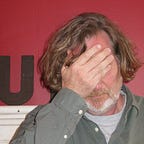RFBC #17: The Rabbit Hutch
A wow of a novel by a young Indiana author—and a link to our podcast.
Tess Gunty is from Indiana. Tess Gunty’s first novel, The Rabbit Hutch, is set in Indiana. It won the National Book Award for Fiction in 2022. Seeing as how we’re based in Indianapolis, and we read a whole lot of contemporary fiction, it only made sense that we’d want to talk about The Rabbit Hutch at the November 2023 meeting of Radio Free Book Club.
The National Book Award folks weren’t the only ones who loved The Rabbit Hutch. It was a best-book-of-the-year choice for The New York Times, People, TIME, Oprah Daily, LitHub, The Chicago Tribune, and elsewhere. Pretty impressive for a novelist who’d yet to hit her 30th birthday; in fact, Gunty was the youngest winner of the National Book Award since Philip Roth won in 1960 for Goodbye, Columbus. Heady company, for sure.
Did we like it, though? Would you like it? If you’re planning to read it, you might want to come back to this post—and our podcast—at a later time. We will be spoiling The Rabbit Hutch, although one of our members voiced the idea that it’s relatively unspoilable. So, maybe, sure: Read away. Or come back. We’ll be right here.
Show notes:
The RFBC crew for our November 2023 show was Indianapolis writer Ken Honeywell; author and ex-Butler University professor Susan Neville; writer/baker/woman about town Traci Cumbay; and author/editor/award-winning sportswriter Kate Shoup. Our show was recorded at Listen Hear in Indianapolis and produced by the outstanding Oreo Jones for 99.1 WQRT-LP.
Susan had a leg up on us. She’d interviewed Tess Gunty as part of Indiana Humanities’ INconversation series.
Unspoilable? That’s what Ken suggested. Perhaps the only spoiler—spoiler alert—is that Blandine does not die at the end. Otherwise, there’s not a whole lot to keep secret.
The writing. The writing. Beautiful. Though we all had quibbles with some parts of the book, we all agreed that Gunty’s style is mesmerizing and that Blandine, the protagonist, was a fascinating character.
Did we need all those other characters who lived in the Rabbit Hutch? We all agreed: Probably not. Susan noted that Gunty had started off writing what she thought was going to be a work of connected short stories. That feels like where the book is going—and then it doesn’t. Most of the stories of the others who lived in the building had no connection with the main plot.
About the affair…Tiffany—who changes her name to Blandine—has an affair with a teacher that takes up a big chunk of the book. While it was certainly important for character development, this section felt tonally different—more realistic—than the rest of the book.
Vacca Vale felt like Indiana — sort of. Gunty is from South Bend, and much of the novel — including the fact that Zorn had an impact on the city very much like Studebaker’s effect on South Bend, and the idea of a small city trying to remake itself to attract tech business — felt like Indiana. At the same time, Susan noted that Gunty wrote The Rabbit Hutch while living in Brooklyn, and the apartment living it depicted may have reflected that.
DFW? Ken noted some David Foster Wallace influence in the storytelling, and a little googling confirmed he was not alone; in fact, he also found an interview with the author in which she identified A Supposedly Fun Thing I’ll Never Do Again as her go-to work of nonfiction.
Moses’s affliction is a real thing. It’s called Morgellons disease, a controversial skin condition that can include sores that sufferers claim include fibers. Joni Mitchell suffers from Morgellons disease. The Mayo Clinic calls it a “delusional parasitosis.” Traci recalled that it might be the condition described memorably, and movingly, in Eleanor Henderson’s memoir Everything I Have Is Yours.
According to Todd, the chapter told in illustrations created by the author’s brother, impressed all of us, even as it reminded us of the PowerPoint chapter of Jennifer Egan’s A Visit from the Goon Squad.
Would we all write our own obituaries, as Elsie Jane McLoughlin Blitz did? We would. No doubt some of us will.
Would we recommend it? Susan would recommend the book and expressed excitement for Gunty’s next novel. Kate would recommend it for lovers of literary fiction, not so much for readers looking for something more plot driven. Traci loved it and has already recommended it many times. Ken also loved it, and felt much the same way Kate did: that The Rabbit Hutch is probably not for everyone, but he’d recommend it most highly to others.
Bonus recommendations: Traci was excited to recommend a new anthology featuring her own work and that of frequent book clubber Barb Shoup (Kate’s mom): Playing Authors. Good luck finding it: it sold out in about a week. Susan recommended The Bell by Iris Murdoch, another novel fascinated with the mystics; and Showings of Julian of Norwich: A New Translation by Mirabai Starr. Kate, having fallen into the Jane Austin Universe, recommended The Other Bennet Sister by Janice Hadlow and Longbourn by Jo Baker, along with the poet Maggie Smith’s You Could Make This Place Beautiful . Ken, following up on his DFW comment, recommended A Supposedly Fun Thing I’ll Never Do Again.
Next month: We discuss the great Tim O’Brien’s first novel in more than twenty years, America Fantastica. Will you read it? We’d love to know what you think, too.
